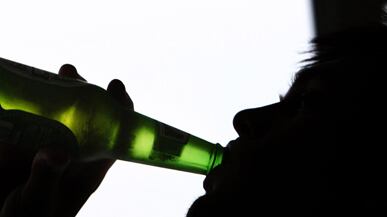Schools (or parents) that want to predict how certain students will perform academically would do well to look at their drinking habits, according to new research.
A study presented this week found that, next to time spent studying outside the classroom, time spent drinking was the most reliable predictor of a student’s grade point average. Todd Wyatt, a doctoral candidate at George Mason University, looked at how today’s busy college students allocate their time between different activities. The research surveyed about 13,900 incoming freshman at 167 schools, and found that certain activities could reliably predict academic success. He performed the study along with his colleague Bill DeJong and presented it this week at the American College Personnel Association conference.

Wyatt found that, after time spent studying, the amount of time a student spent drinking was the strongest predictor of that student’s GPA – even more so than time spent in the classroom. “The more time spent partying with alcohol, there’s a significant decrease in GPA,” said Wyatt. This was true even though various other non-studious activities, like wiling away hours on Facebook, had virtually no effect on grades.
The study’s findings hold true even when narrowed to include only elite schools – big-name universities where students are famous for studying hard and partying hard. The researchers replicated the overall population investigation at specific schools where students have an above-average GPAs and also reported above-average alcohol consumption. The result: drinking affects these kids’ grades, too. “These students might not be reaching their full potential as a result of the alcohol consumption,” says Wyatt. “Their grades are high, but they could be even higher.”
But the researchers did see some differences when drinking was complemented by other activities. For instance, students who drank but also volunteered or did some other kind of extracurricular activity showed fewer negative consequences like skipping class, blowing off work, or failing assignments than classmates who spent time drinking but didn’t participate in other outside activities.
In the 1960s, college kids studied 24 hours a week. Now it’s slipped to just 7.25 hours.
What Wyatt found most surprising about his study was how little social networking affected a student’s grades. “Everyone says being on Facebook plays a predictive role in academic success,” he says. “But social networking didn’t play nearly as predictive a role as studying and drinking.” Another surprise: Even today, when young people seem to conduct much of their social lives online, students reported spending less time per week on social networking sites (4.41 hours) than they did watching TV (5.32 hours), studying (7.25 hours), working (7.61 hours), and attending class (14.21 hours).
If studying 7.25 hours a week doesn’t sound like much for a college student, that’s because it’s not. Although studying still ranked third in how students allot their time, it’s been on the decline for years. In the 1960s, college kids studied 24 hours a week, according to an American Enterprise Institute report. By 2005 that number had plummeted to 11 hours. Now it’s slipped to just 7.25 hours. Kids are more socially involved and playing more sports, but perhaps making more time for drinking and drug use, too.
Although there was a clear predictive relation between certain activities and grades, there are a variety of other variables that might also be playing a role. For instance, students who spend more time drinking might simply be less serious about their academic careers. The main value of the study lies in using the relationships between study time, alcohol consumption, and academic success to predict student behavior so colleges can develop programs that target specific students in danger of falling behind.
For mitigating alcohol use, many schools are already working on this through alcohol awareness programs, community approaches, and online courses. “An online alcohol education mandate for everyone coming into campus has been shown to be an effective product,” says Wyatt, who works in this field. But some schools are now looking at individual approaches as well, targeted toward specific students.
While the research doesn’t delve into causation, Wyatt is hoping to examine more factors, like motivation and depression, in the future. “There are a lot of other predictors of success,” he says “but I am confident that these two variables [studying and alcohol] are playing their part in predicting student success.”
Kristina Dell is an editor at Newsweek.com and runs the education website. Previously, she wrote for TIME magazine. Her stories have also appeared in the Wall Street Journal, the Washington Post, and Reader's Digest.






